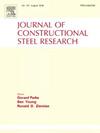Experimental and numerical investigations of the octagonal concrete-filled thin-walled tube columns with binding bars (O-CFT-WBB) under compressive pressure and thermal loads
IF 4
2区 工程技术
Q1 CONSTRUCTION & BUILDING TECHNOLOGY
引用次数: 0
Abstract
An experimental and theoretical investigation is conducted to evaluate the behavior of CFT columns with a unique geometric cross-section under axial loading and in a thermal environment. In this study, based on previous research on octagonal CFT columns, this geometry was chosen as a favorable option compared to other possible configurations. Additionally, binding bars were employed to enhance these columns' mechanical and thermal behavior. A thermal gradient (temperature changes ranging from 0 to 600 degrees) was applied in the laboratory to replicate extreme environmental conditions. By experimental results, a theoretical investigation was conducted to derive suggested formulas for considering confinement effects in O-CFT-WBB columns, and the results were then compared with experimental results and the closest existing formulas. After examining the experimental results, it was shown that the presented formulas had more accuracy than the existing ones. Additionally, based on the experimental results, the presence of binding bars at different temperatures led to different behaviors in the axial capacity of the columns. According to the results, the binding bars in the O-CFT-WB columns can lead to different behaviors in the axial capacity of the columns. Based on a constitutive model of confined concrete, a method for calculating the maximum strength of L-shaped CFT columns with and without binding bars is proposed. The method is verified with experimental results from this test program and data from other experiments.
带约束杆的八角形混凝土填充薄壁管柱(O-CFT-WBB)在压缩压力和热负荷下的实验和数值研究
通过实验和理论研究,对具有独特几何截面的 CFT 柱在轴向载荷和热环境下的行为进行了评估。在这项研究中,基于之前对八角形 CFT 柱的研究,与其他可能的配置相比,选择了这种几何形状。此外,还采用了结合棒来增强这些柱子的机械和热性能。在实验室中采用热梯度(温度变化范围从 0 度到 600 度)来模拟极端环境条件。根据实验结果,进行了理论研究,得出了考虑 O-CFT-WBB 柱约束效应的建议公式,并将结果与实验结果和最接近的现有公式进行了比较。实验结果表明,所提出的公式比现有公式更加精确。此外,根据实验结果,在不同温度下绑定杆的存在导致了柱子轴向承载力的不同表现。根据实验结果,O-CFT-WB 柱中的约束条会导致柱子轴向承载力的不同表现。基于约束混凝土的构成模型,提出了一种计算有约束杆和无约束杆 L 型 CFT 柱最大强度的方法。本测试程序的实验结果和其他实验数据对该方法进行了验证。
本文章由计算机程序翻译,如有差异,请以英文原文为准。
求助全文
约1分钟内获得全文
求助全文
来源期刊

Journal of Constructional Steel Research
工程技术-工程:土木
CiteScore
7.90
自引率
19.50%
发文量
550
审稿时长
46 days
期刊介绍:
The Journal of Constructional Steel Research provides an international forum for the presentation and discussion of the latest developments in structural steel research and their applications. It is aimed not only at researchers but also at those likely to be most affected by research results, i.e. designers and fabricators. Original papers of a high standard dealing with all aspects of steel research including theoretical and experimental research on elements, assemblages, connection and material properties are considered for publication.
 求助内容:
求助内容: 应助结果提醒方式:
应助结果提醒方式:


